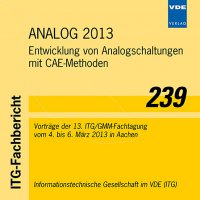Short Term NBTI Degradation in Switched-Capacitor Circuits
Konferenz: ANALOG 2013 - Entwicklung von Analogschaltungen mit CAE-Methoden - Vorträge der 13. ITG/GMM-Fachtagung
04.03.2013 - 06.03.2013 in Aachen, Deutschland
Tagungsband: ANALOG 2013 - Entwicklung von Analogschaltungen mit CAE-Methoden
Seiten: 6Sprache: EnglischTyp: PDF
Persönliche VDE-Mitglieder erhalten auf diesen Artikel 10% Rabatt
Autoren:
Heiß, Leonhard; Yilmaz, Cenk; Werner, Christoph; Schmitt-Landsiedel, Doris (Lehrstuhl für Technische Elektronik, Technische Universität München, Germany)
Inhalt:
Due to non constant field scaling and introduction of nitrided gate oxides, negative bias temperature instability (NBTI) has become a significant reliability issue in modern CMOS technologies. The main impact of NBTI stress is a change of the threshold voltage of pMOS transistors which can partly recover during subsequent relaxation. State of the art reliability research assumes that this NBTI induced Vth-shift builds up only slowly compared to common operating frequencies of CMOS circuits and thus causes circuit failure merely after several years of operation. Besides this well-known long term degradation, the application of short stress pulses causes threshold voltage shifts in the mV regime and subsequent relaxation as well [1]. Although such transient variations of Vth due to short term NBTI effects can cause failures in analog circuits [2], [3], the effect got hardly investigated in former research on circuit reliability. In this paper we will discuss a new approach to model short term device degradation. Using our model, we will give novel insights into the impacts of short term NBTI on a switched-capacitor comparator and a successive approximation analog-to-digital converter in a 65 nm technology.


